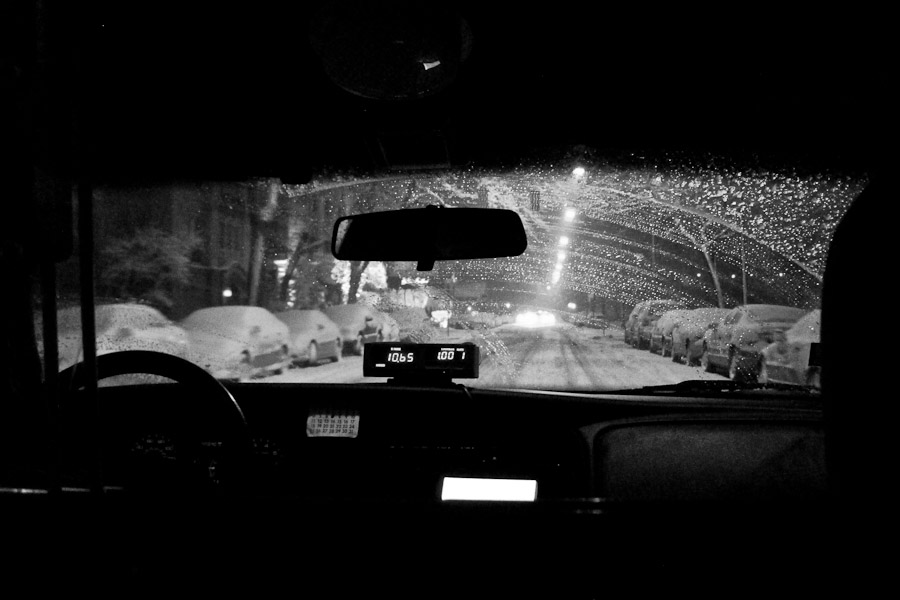My team are all working from home today because we have the technology to do so, and we saw this:
A WINTER STORM WARNING REMAINS IN EFFECT FROM 9 AM THIS MORNING
TO MIDNIGHT CST TONIGHT.
* TIMING...SNOW WILL DEVELOP DURING THE MID TO LATE MORNING HOURS
AND CONTINUE THROUGH THIS AFTERNOON...ENDING TONIGHT. THE
HEAVIEST SNOWFALL WILL OCCUR THIS AFTERNOON.
* ACCUMULATIONS...SNOWFALL TOTALS OF 5 TO 8 INCHES CAN BE
EXPECTED.
* HAZARDS...SNOW WILL FALL HEAVILY AT TIMES RESULTING IN REDUCED
VISIBILITIES AND SNOWFALL RATES OF AROUND ONE INCH PER HOUR AT
TIMES.
* IMPACTS...ACCUMULATING SNOW WILL CAUSE SIGNIFICANTLY INCREASED
TRAVEL TIMES...RESULTING IN A PARTICULARLY TREACHEROUS COMMUTE
THIS AFTERNOON. IN ADDITION...VERY COLD TEMPERATURES IN THE
TEENS WILL MAKE SALT LESS EFFECTIVE AND COMBINE WITH HEAVY
SNOWFALL RATES TO MAKE IT HARDER FOR ROAD CREWS TO KEEP ROADS
CLEAR OF SNOW AND ICE. THE SNOW WILL ALSO RESULT IN SIGNIFICANT
DISRUPTIONS TO AIR TRAVEL AS WELL.
PRECAUTIONARY/PREPAREDNESS ACTIONS...
A WINTER STORM WARNING FOR HEAVY SNOW MEANS SEVERE WINTER WEATHER
CONDITIONS ARE EXPECTED OR OCCURRING. SIGNIFICANT AMOUNTS OF SNOW
ARE FORECAST THAT WILL MAKE TRAVEL DANGEROUS. ONLY TRAVEL IN AN
EMERGENCY. IF YOU MUST TRAVEL...KEEP AN EXTRA FLASHLIGHT...
FOOD...AND WATER IN YOUR VEHICLE IN CASE OF AN EMERGENCY.
Parker is also working from home. If he could read, his attitude toward the weather warning might differ slightly from mine. On the other hand, we're both in the same room, which I think makes him happy anyway.
Updates and photos as events warrant.
A couple of things have happened on two issues I mentioned earlier this week:
That is all for now. We in Chicago are bracing for 15 cm of snow tomorrow, so there may be Parker videos soon.
Oh, and: Kodak actually did file for bankruptcy protection today.
Via reader HF, the Supreme Court today decided Golan v Holder (pdf), in which the court held 6-2 that Congress was within its authority to restore copyright protection to some foreign works that had formerly lapsed into the public domain in the U.S.
Writing for the majority, Justice Ginsburg said: "Neither the Copyright and Patent Clause nor the First Amendment, we hold, makes the public domain, in any and all cases, a territory that works may never exit."
I'm still digesting the opinion, but let me say on first reading that it does not give Congress blanket authorization to restore copyright to works in the public domain, despite Wired's alarmist article. The circumstances of this case seem clear, well-defined, and narrow. Only works that never left copyright protection in the country where the work or the author came from, but lapsed into public domain in the U.S., are covered. Also, the decision only applies prospectively, so that authors whose works were copied or performed here during the lapse period will not require retroactive royalty payments. And the works will, in due course, return to the public domain, in most cases 70 years after the author's death.
To give an example: the works of Sergei Prokofiev, which generally went into the public domain in the U.S. 28 years after he wrote them, will return to copyright protection until 70 years after his death; i.e., at the end of 2023. But none of the recordings of his music made before today are affected. (Clarification: copies that exist as of this morning are not affected; any copies made from today forward are.)
Also, with the merciful strangling of SOPA this afternoon, the Copyright Police aren't going to block the iTunes store on suspicion of harboring "Peter and the Wolf." (Youporn, on the other hand, probably shouldn't have that one to begin with.)
Congress enacted the law in question to ensure that U.S. copyright holders get the same protection from other WTO members that other countries' authors get from us. Of course, who many of those copyright holders are, and the way they cling pathetically to an obsolete business model the way rats cling to flotsam in the ocean, is a different matter entirely. I recommend Lawrence Lessig's thoughts on SOPA to get you riled up about that problem.
The Economist this week examines the imminent death of Kodak, which in the 1970s commanded 90% of the film market:
Then came digital photography to replace film, and smartphones to replace cameras. Kodak’s revenues peaked at nearly $16 billion in 1996 and its profits at $2.5 billion in 1999. The consensus forecast by analysts is that its revenues in 2011 were $6.2 billion. It recently reported a third-quarter loss of $222m, the ninth quarterly loss in three years. In 1988, Kodak employed over 145,000 workers worldwide; at the last count, barely one-tenth as many. Its share price has fallen by nearly 90% in the past year (see chart).
Despite its strengths—hefty investment in research, a rigorous approach to manufacturing and good relations with its local community—Kodak had become a complacent monopolist. Fujifilm exposed this weakness by bagging the sponsorship of the 1984 Olympics in Los Angeles while Kodak dithered. The publicity helped Fujifilm’s far cheaper film invade Kodak’s home market.
Another reason why Kodak was slow to change was that its executives “suffered from a mentality of perfect products, rather than the high-tech mindset of make it, launch it, fix it,” says Rosabeth Moss Kanter of Harvard Business School, who has advised the firm. Working in a one-company town did not help, either. Kodak’s bosses in Rochester seldom heard much criticism of the firm, she says. Even when Kodak decided to diversify, it took years to make its first acquisition.
Management matters. And all things end. It's still sad.
Welcome back. We were dark today to protest two flawed legislative proposals, the Stop Online Piracy Act and the Protect IP Act.
The administration today hinted at a threat to veto SOPA, while several senators have withdrawn support for PIPA in response to the blackout protests around the Internet:
Co-sponsors who say they can no longer support their own legislation include Senators Marco Rubio, a Florida Republican, Roy Blunt, a Missouri Republican, and Ben Cardin, a Maryland Democrat. Republican Representatives Ben Quayle of Arizona, Lee Terry of Nebraska, and Dennis Ross of Florida also said they would withdraw their backing of the House bill.
Rubio said he switched his position on the Senate measure, the Protect IP Act, after examining opponents’ contention that it would present a “potentially unreasonable expansion of the federal government’s power to impact the Internet,” according to a posting today on Facebook. Blunt said in a statement today he is withdrawing as a co-sponsor of the Senate bill.
The Washington Monthly explains the administration's volte face on SOPA:
The White House didn’t issue a veto threat, per se, but the administration’s chief technology officials concluded, “We will not support legislation that reduces freedom of expression, increases cybersecurity risk or undermines the dynamic, innovative global Internet.” The statement added that any proposed legislation “must not tamper with the technical architecture of the Internet.” The White House’s position left SOPA and PIPA, at least in their current form, effectively dead.
The state of play in the Senate is a little different — a PIPA vote is likely next Tuesday — but even in the upper chamber, the bill is quickly losing friends. Sen. Scott Brown (R-Mass.) announced his opposition yesterday, and Sen. Ben Cardin (D-Md.), a former co-sponsor of PIPA, is also now against it.
The President did, however, shut down the Keystone XL pipeline (at least for now).
So, in all, this was a pretty good day for the people.
Update: Via Coding Horror, Mozilla Foundation Chair Mitchell Baker has a great description of why PIPA and SOPA are so awful.
To counter SOPA, a Swedish group has gotten official recognition as a religion on the idea of Holy Information:
The church, which holds CTRL+C and CTRL+V (shortcuts for copy and paste) as sacred symbols, does not directly promote illegal file sharing, focusing instead on the open distribution of knowledge to all.
It was founded by 19-year-old philosophy student and leader Isak Gerson. He hopes that file-sharing will now be given religious protection.
"For the Church of Kopimism, information is holy and copying is a sacrament. Information holds a value, in itself and in what it contains and the value multiplies through copying. Therefore copying is central for the organisation and its members," he said in a statement.
I can't wait to see which angels help them decipher their silicon tablets...
The largest encyclopedia ever assembled will go offline tomorrow to protest against the Stop Online Piracy Act, currently working its way through Congress's collective bowels. From Wikipedia's public statement:
[T]he Wikimedia Foundation is asked to allocate resources and assist the community in blacking out the project globally for 24 hours starting at 05:00 UTC on January 18, 2012, or at another time as determined by the Wikimedia Foundation. This should be carried out while respecting technical limitations of the underlying software, and should specifically prevent editing wherever possible. Provisions for emergency access to the site should be included in the blackout software. In order to assist our readers and the community at large to educate themselves about SOPA and PIPA, these articles and those closely related to them will remain accessible for reading purposes if possible. Wikipedians are urged to work with WMF staff to develop effective messaging for the "blackout screens" that directs readers to suitable online resources. Sister projects, such as the German and Italian Wikipedias and Wikimedia Commons, have indicated an intention to support the same principles with banners on those sites, and the support of other projects is welcome and appreciated.
Twitter CEO Dick Costolo is unimpressed: " 'That's just silly. Closing a global business in reaction to single-issue national politics is foolish,' Costolo [said]."
For what it's worth, my U.S. Senators are split: Senator Mark Kirk (R-IL) claims to be opposed to it, while Senator Dick Durbin (D-IL) is a co-sponsor of the Senate's version. Neither has any material on his website about it. I have written to Senator Durbin and to Representative Mike Quigley (D-IL) for comment.
We're having a very odd winter. After bottoming out at -15°C just yesterday, the temperature in Chicago has climbed past 6°C and it's getting warmer. Here's one consequence, which you can compare to Thursday:

Today's forecast calls for rain and 8°C; the record for January 16 is 14°C.
 Rumors abound that American Airlines has two suitors, one we knew about and one we didn't. Since filing for bankruptcy in November, industry analysts have wondered with whom they would merge, twice-spurned USAirways the most obvious choice.
Rumors abound that American Airlines has two suitors, one we knew about and one we didn't. Since filing for bankruptcy in November, industry analysts have wondered with whom they would merge, twice-spurned USAirways the most obvious choice.
The new rumors, however, have Delta puttin' the moves on, which, if consummated, would make Delmerican (Amelta?) the world's largest airline and put the oneworld alliance in existential peril:
Since I'm generally bullish on the airline alliances (and competition between them), I'd tend to think the US Airways/oneworld route would be better for competition, and thus better for travellers. But the real question is what American government regulators and anti-trust authorities think about the whole idea. A Delta-American merger would produce a company that would control a huge chunk of domestic market—29.6%, double the share of its next biggest competitor, Southwest Airlines.
Another issue is whether Delta's supposed interest in acquiring American is serious or simply an effort to cause problems for US Airways and oneworld. It's hard to imagine that Delta's executives aren't aware of the regulatory problems a merger with American might face. Whatever happens, this struggle will be interesting to watch.
Blogger Matt Yglesias argues that an American/USAirways merger would be more patriotic, and "would give the United States three really big global carriers—United, Delta, and US/American—with the merged entity ideally joining the OneWorld alliance so we'd have strong representation in each of the three major global airline alliances." And it would keep Chicago one of aviation's world capitals, since a merger with Delta would encourage shutting either O'Hare or Delta's nearby hub in Detroit.
With this many rumors circulating, I expect we'll hear something definitive relatively soon.
...at least for a few days. From last night in Chicago:

And:
